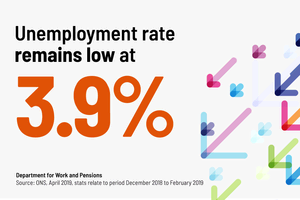UK economy delivering record employment

The UK jobs market has continued to grow with 457,000 more people in work in February compared to last year.
New figures published by the Office for National Statistics (ONS) show the employment rate has never been higher at 76.1%, while unemployment remains at its lowest rate since the 1970s at 3.9%.
There are over 1.1 million fewer unemployed people than in 2010, with youth unemployment level almost halved in that time.
Today’s labour market statistics published by the Office for National Statistics (ONS) show the number of vacancies at 852,000 for January to March, 32,000 more than a year earlier.
The UK unemployment rate was estimated at 3.9%; it has not been lower since November 1974 to January 1975. There were an estimated 1.34 million unemployed people, 76,000 fewer than for a year earlier and 914,000 fewer than for five years earlier.
The UK employment rate was estimated at 76.1%, higher than for a year earlier (75.4%) and the joint-highest figure on record, with 32.72 million people in employment, 457,000 more than for a year earlier. The UK economic inactivity rate was estimated at 20.7%, lower than for a year earlier (21.2%) and the joint-lowest figure on record.
Recruitment & Employment Confederation (REC) chief executive Neil Carberry commenting on ONS labour market figures:
“Today’s figures demonstrate the strength of the jobs market, which is a key UK success story. There are opportunities out there for job-seekers to move and take their careers to the next level.
“While progress on employment has slowed in the face of uncertainty about Brexit and slower global growth, our surveys show that firms are still experiencing shortages of key staff. This is a big risk to future growth.
“Recruiters are working with their clients to address shortages, playing a pivotal role for more and more firms as shortages bite. But businesses, recruiters and employees need Government to back them up. A strong start would be changing skills policy to help fill key shortage roles. Reforming the apprenticeship levy into something that can help temporary workers develop their careers is an essential part of this.”
Employment Minister Alok Sharma welcomed the figures from the ONS which also showed wages outpacing inflation for 13 months in a row, with real wages growing by 1.6% on the year.
Minister of State for Employment Alok Sharma said:
“The UK jobs market continues to go from strength to strength, proving the underlying resilience of the British economy.
“But we must not take this for granted. We need to work urgently to get behind a Brexit deal that protects this jobs record and gives employers the certainty to continue to invest in their workforce and boost wages.
“With more people in work than ever before, it is welcome news that wages are continuing to rise at their fastest rate in a decade.
“And by increasing the living wage and personal tax allowance for 2019, this government is putting more money in people’s pocket, benefiting millions of families across the country.”

The government has made more changes to the tax system for 2019 to ensure people are keeping more of what they earn.
The Universal Credit work allowance is increasing by an extra £1,000 per year
From April, working parents and disabled people will be able to earn an extra £1,000 a year before their Universal Credit starts to reduce. This change will see 2.4 million families keep up to an extra £630 per year of what they earn.
Fuel duty will remain frozen for the ninth year in a row
It will remain at 57.95 pence per litre across the UK. Fuel duty has been frozen for the ninth successive year, saving the average car driver £1,000.
Access to Work is increasing by an extra £2,000 per year
From 1 April 2019 people will be able to claim up to £59,200 annually through the Access to Work scheme to help pay for additional support that they may need in the workplace. This can include workplace adaptations, assistive technology, transport and interpreters.











Responses